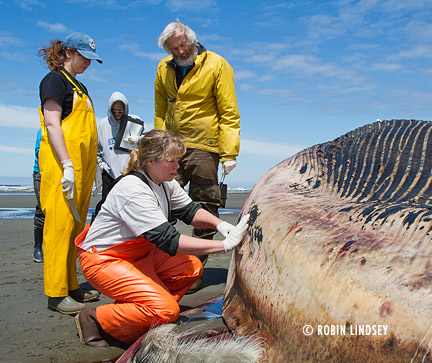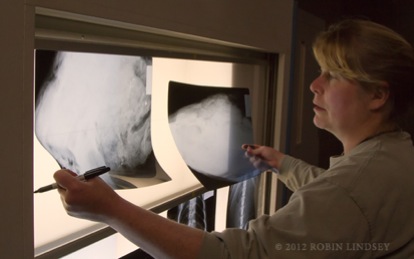Funding cuts a huge blow to Washington State marine mammals
Oct/04/13 02:54 PM

As a critical member of NOAA’s Northwest Marine Mammal Stranding Network, WDFW-MMI provides marine mammal response and triage to a wide geographic area, including both inland waterways and the outer coast of Washington. The public not only expects, but demands that marine mammals, alive or dead on the beach, be tended to (such as the fin whale shown here on an Ocean City beach in June). It puts both the animals and the public in danger if there is not a professional response to these strandings.
Washington State takes great pride in our marine mammals. We should take all necessary steps now and set aside Sate funding to ensure their protection, independent of Federal grants. The scientific work performed by WDFW-MMI is crucial to the health of marine mammals and of our State’s marine ecosystem. WDFW- MMI is one of the few organizations in place in Washington State to perform marine mammal necropsies. Most stranding networks in the Pacific Northwest turn to them for advice because of their decades of expertise and behavioral observations. The value of this collaborative relationship is incalculable. This “citizen science” mentoring of network volunteers across the region greatly assists the State in its work protecting marine wildlife.
The amount of research that has been performed by WDFW-MMI, often in conjunction with other members of the NWMMSN, is both impressive and important - from monitoring emerging disease in marine mammals to the devastating impact of contaminants. Their studies of harbor seals, a sentinel species, reveal the health of our marine ecosystem as a whole. Their 2005 study revealed that harbor seals in South Puget Sound were 7 times more contaminated with PCBs and other toxins than those living in Canada’s Georgia Strait. Without WDFW-MMI’s response, we would not have known that Guadalupe Fur Seals have returned to the outer coast of Washington after many decades of absence. We would not know of the transfer of land mammal diseases to marine mammals and other emerging zoonotic diseases. It is imperative that this work be funded and continue.

For the past 7 years, Dyanna and the WDFW-MMI team have provided immeasurable support to Seal Sitters MMSN. They have been our sole resource for necropsy to determine mortality of seal pups, adult seals and sea lions and harbor porpoise. She has generously mentored our network, sharing her knowledge and improving our ability to assess animals during response. Seal Sitters has now responded to 12 dead seal pups (2 today) this 2013 harbor seal pupping season - almost all of them horribly thin. Our official start date for pupping season in West Seattle was July 19th with a response to a stillborn pup at Harbor Island. This is the highest number of dead pups this early in pupping season in the years Seal Sitters has been responding to marine mammals. With WDFW-MMI resources no longer available for necropsy, we will have no means to determine cause of mortality of marine mammals - other than high profile whale strandings or, perhaps, shooting investigations.
What cannot be measured or replaced is the passion and leadership of Dyanna Lambourn. The interns (and future marine mammal biologists) studying under her get an intensive and unique opportunity for hands-on experience with marine mammals, learning biology and behavior. However, what cannot be taught is passion. Passion is inspired by leadership and example. There is no one in those categories who can surpass Dyanna Lambourn, whose interns work tirelessly, as she does, at her side.
STATE FUNDING SHOULD BE IN PLACE TO HELP MARINE MAMMALS
WDFW-MMI provides tremendous value to Washington residents, playing a pivotal role in protecting and preserving the marine wildlife we all treasure. Please contact your State representatives, State senators, and Governor Jay Inslee. Let them know that protecting our marine mammals is important to you. Request that the State set aside some funding so that this critical WDFW-MMI team can continue their research and support of other members of NOAA’s Northwest Marine Mammal Stranding Network. Please email WDFW’s Director - let him know that you care about marine mammals and that research and response should remain an integral part of WDFW’s work. Washington State should not depend on dwindling funds from the Federal Government to ensure our marine mammals are protected.
PRESCOTT GRANT FUNDS NEED TO REMAIN IN THE NATIONAL BUDGET
Federal Prescott funding for 2013 was slashed from roughly $4 million (with approximately 40 grants awarded annually to stranding networks across the country) to just over $1million - and only a dozen grants awarded this year for the entire nation. Read Wired Magazine’s report on the impacts of this decimated funding here.
To read more about how NOAA’s Marine Mammal Stranding Network depends on this funding for both response and research, click here. Contact your representatives in the US House of Representatives and US Senate - tell them marine mammals are important to you and insist that Prescott grant funding be included in the President’s 2014 FY Budget. This tiny part of the many billion dollar Federal budget is in jeopardy of disappearing entirely in the near future. We need to act now to ensure critical research and protection of marine mammals!







